Wither
Europa?
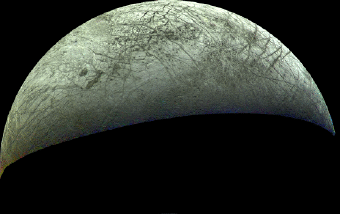
During the course of tracking recent events
at the South Pole, one of the curiosities that has arisen centers on the
bizarre involvement of the National Security Agency in “civilian” Antarctic
research. Although JPL's Frank Carsey, who runs the JPL Vostok/Europa
drilling project in Antarctica, confirmed that he had no knowledge of
any current NSA drilling efforts similar to his own, he did make
it clear that the NSA had been a source of major Antarctic research
funding in the past, and that “their monies are now sorely missed.”
The history of Antarctic exploration (especially post WWII), with the
heavy (and surprising) involvement of the US military and its “security
concerns,” is a strange and unique tale that deserves more space than
we can provide here (however, we will address this major subject in a
later update). Suffice it to say, US security agencies have had
a far deeper, if not mystifying, interest than they should have over the
years in Antarctica -- given the desolate, non-strategic and totally isolated
nature of the White Continent. Although there have been recent rumors
of “a HAARP-like project” near the South Pole, it's unclear exactly what
long-term national security interests may have been involved on the least
populated continent (unless you're counting the penguins!) on the planet.
What has become clear in the last five years is that Antarctica
has unique research value in the context of at least one extraordinary
new idea that does have rampant “national security implications”--
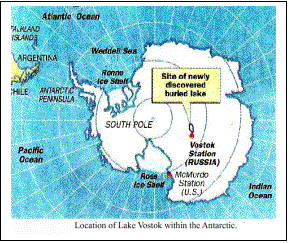 Life
on Europa.
Life
on Europa.
As the NASA-commissioned Brookings report
makes clear, the discovery of artifacts or extraterrestrial life in the
solar system is considered a preeminent “national security concern.” Presumably,
the discovery of similar ancient artifacts below the ice at the South
Pole (left) would fall under the same “security umbrella.”
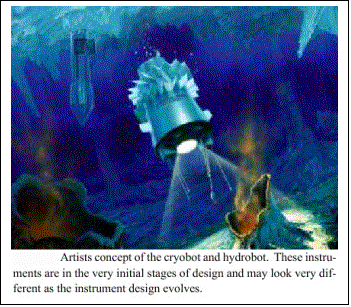 It
doesn't take a very broad reading of the Brookings document to see how
Europa -- the second major
moon of Jupiter -- could now fall into exactly the same category. The
confirmation of life under the icy crust of Europa, especially if it is
complex, developed life -- as Enterprise principal investigator
Richard C. Hoagland suggested over twenty years ago in his historic paper,
"The Europa Enigma" -- would have
far reaching social and political implications of precisely the nature
that so concerned the authors of that key NASA Study over forty years
ago. Perhaps it is this concern which has driven NASA and the National
Science Foundation to suddenly all
but abandon their experiments at the South Pole (above, right).
This has had the result, as one strategically placed NASA source
informed us (on the condition of anonymity), of putting drilling into
Europa so far on the backburner that “we will likely never see
the question [of alien life beneath its ice] settled in our lifetimes.”
It
doesn't take a very broad reading of the Brookings document to see how
Europa -- the second major
moon of Jupiter -- could now fall into exactly the same category. The
confirmation of life under the icy crust of Europa, especially if it is
complex, developed life -- as Enterprise principal investigator
Richard C. Hoagland suggested over twenty years ago in his historic paper,
"The Europa Enigma" -- would have
far reaching social and political implications of precisely the nature
that so concerned the authors of that key NASA Study over forty years
ago. Perhaps it is this concern which has driven NASA and the National
Science Foundation to suddenly all
but abandon their experiments at the South Pole (above, right).
This has had the result, as one strategically placed NASA source
informed us (on the condition of anonymity), of putting drilling into
Europa so far on the backburner that “we will likely never see
the question [of alien life beneath its ice] settled in our lifetimes.”
However, as JPL project director Frank Carsey has made clear in published
interviews, the problem with getting through the Antarctic ice into Lake
Vostok is not “technical” -- his team has a second device (below,
left) now ready to test -- but overwhelmingly political. Citing
recent “environmental” concerns, Carsey has complained, "NASA is
seriously dragging its feet." The mystifying cessation of his NASA
grant, reported earlier this year, would seem to confirm that stance.
According to Carsey, NASA seems content to hide behind the "green"
concerns as an excuse for not proceeding aggressively with the Vostok
experiments now – which, if properly funded, could have a penetration
and sample-return as early as 2004.
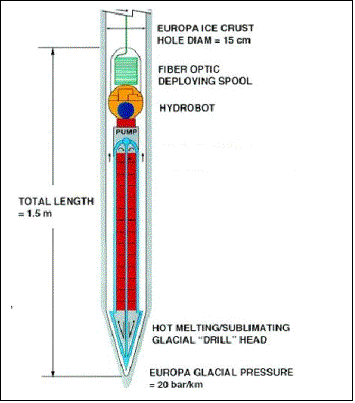
The problem with these environmental concerns is that, as happens many
times, here they may be seriously over-blown. Another source familiar
with the JPL project told us that the microbes found in the Vostok ice
core samples procured a couple years ago “are simply not that unique,”
given the glacial (pun intended) rate at which such organisms evolve.
Carsey has made it clear in his previous interviews that it was impossible
to create a sterilization technology for his probes without any standard
by which to work toward. "No body, national or international, has
said how clean is clean enough," Carsey said in a
Scientific American quoted interview "We need a target to work
toward."
Beyond that, NASA seems curiously unwilling to challenge the question
head-on and move forward in places other than Lake Vostok with the critically
needed engineering research. They have done nothing to push for
an international standard, so that the experiments can proceed. And make
no mistake -- without an ultimately successful Vostok drilling experiment
-- there will be no Europa probe.
It almost seems like NASA "doesn't want to go there."
That would appear, on the surface, completely illogical -- given the supposed
mandate of the Space Agency “to look for alien life.” It would seem to
us that the confirmation of a liquid ocean below Europa’s ice -- and all
the stunning possibilities that discovery would imply -- would be the
best way for NASA to advance its entire exploration agenda, certainly
with a public and Congress eagerly looking for any kind of life
in space. But as we all recall, NASA was quick
to cancel its initial plans to explore Europa several years ago --
even in the wake of stunning Galileo images that seemed to confirm the
presence of that liquid ocean. Only under public pressure were
those plans eventually, partially reinstated. As it stands today, there
are no fully funded plans for any kind of Europa robotic exploration:
no orbiters to take images or spectral analysis; no landers to explore
the mysterious dark cracks, which may contain actual biological materials
(below). And certainly, without Vostok, no missions capable of drilling
through that ice and discovering the wonders “down below.”
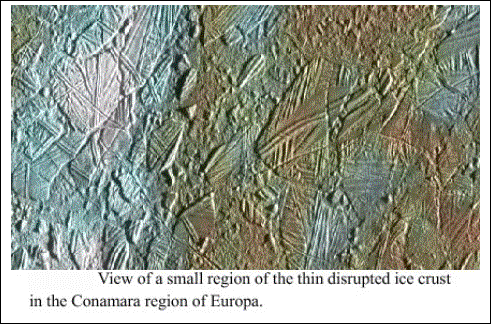
Only in the context of "Brookings" does such a seemingly “illogical” course make any sense. Only if there is quiet, clandestine determination by those at the top not to aggressively seek out new life -- no matter the many public NASA statements to the contrary -- does this “head-in-the-sand”stance seem justified.
Twenty years ago, Hoagland's seminal article inspired Arthur C.
Clarke to "think the unthinkable," and by his own admission
revisit the worlds of "2001" with an equally surprising sequel,
“2010.” We've all seen the tragic way in which NASA inexplicably squandered
the political capital of that first historic film.
As we look back on Clarke and Kubrick’s vision of “2001” from thirty years
perspective, we see no “grand, wheeling Hiltons” offering hotel rooms
to “ordinary mortals” in Earth orbit (Dennis Tito’s unique experience
notwithstanding); no "Orion" space clippers taking tourists
to and from those rooms. No daily shuttles carrying more of them to a
thriving lunar outpost; in fact, NO permanent human presence of any
kind on the beckoning surface of the Moon, over thirty years after
Armstrong and Aldrin left their mark ...
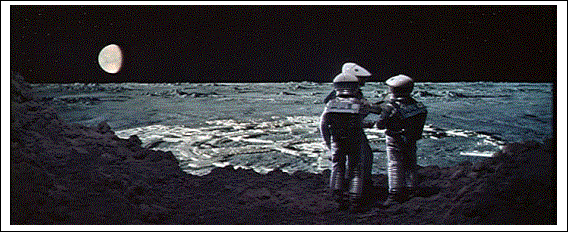 Are
we now, with that failure to "dare greatly" staring us in the
face every time we look up at the Moon (or at the calendar) this year
… going to find ourselves in a similar position vis-à-vis the greatest
solar system challenge of our time, in nine more years? Are we going to
look back on twenty years -- since the idea of finding "something
wonderful" below the ice fields of Europa first entered our discussions
ala Hoagland -- and wonder why we never followed through on that
dream too ..? Are we going to stand on the precipice of the second decade
of the New Century -- no smarter, no less self absorbed, and no more determined
to find our true place in the Universe -- than we have been in the 33
years since "2001" Premiered?
Are
we now, with that failure to "dare greatly" staring us in the
face every time we look up at the Moon (or at the calendar) this year
… going to find ourselves in a similar position vis-à-vis the greatest
solar system challenge of our time, in nine more years? Are we going to
look back on twenty years -- since the idea of finding "something
wonderful" below the ice fields of Europa first entered our discussions
ala Hoagland -- and wonder why we never followed through on that
dream too ..? Are we going to stand on the precipice of the second decade
of the New Century -- no smarter, no less self absorbed, and no more determined
to find our true place in the Universe -- than we have been in the 33
years since "2001" Premiered?
Are WE going to squander the legacy of "2010" the same way we have the mantle of "2001?"
We will not be “given” what we have not earned. We will not reap the benefits of that which we have not demanded. We will not have the truth about ourselves without taking the responsibility to find it for ourselves.
Europa beckons. The world named for the goddess of life, Isis herself, is waiting. When will we reach out and take her outstretched hand ..?